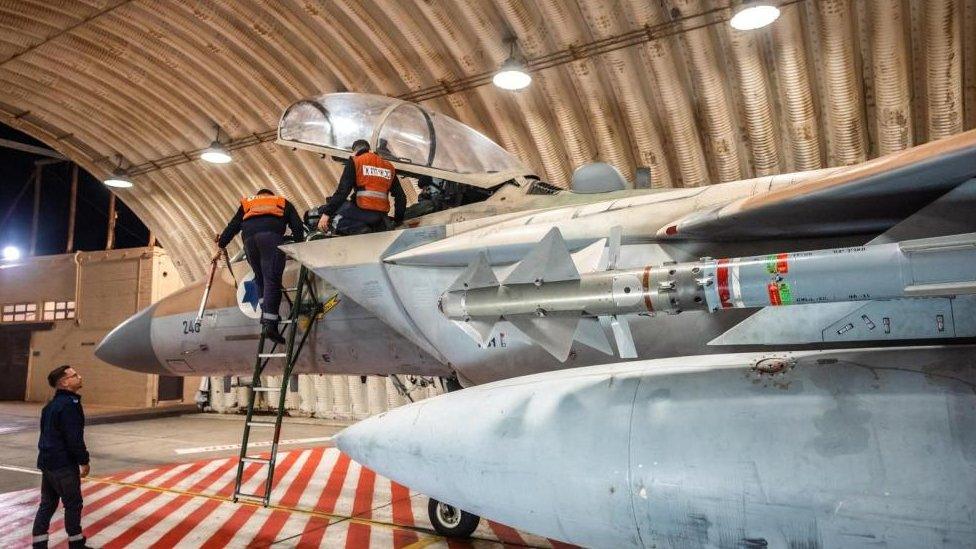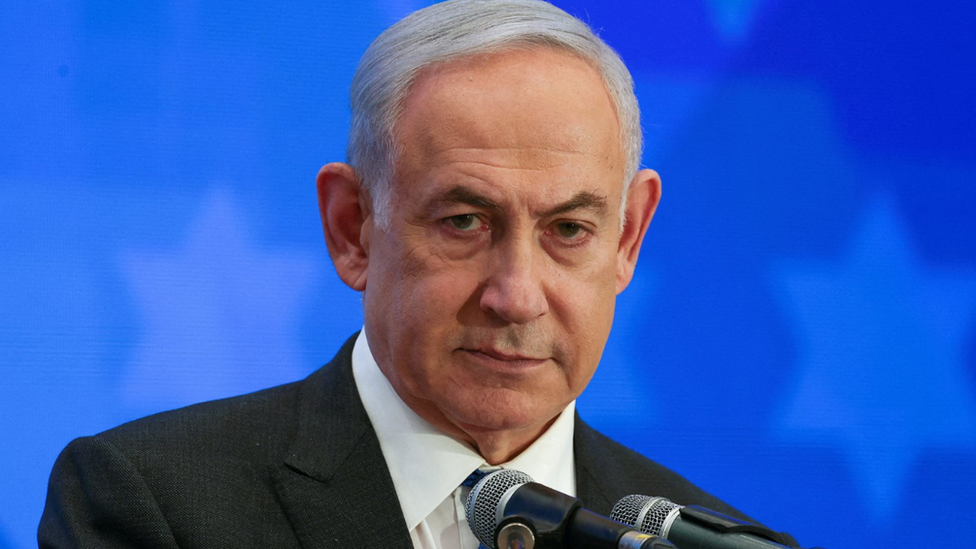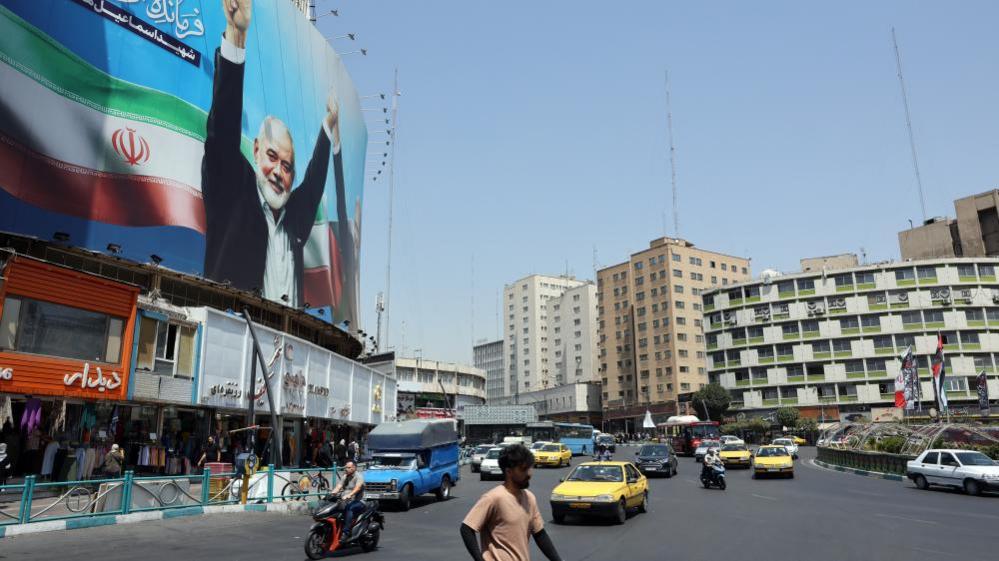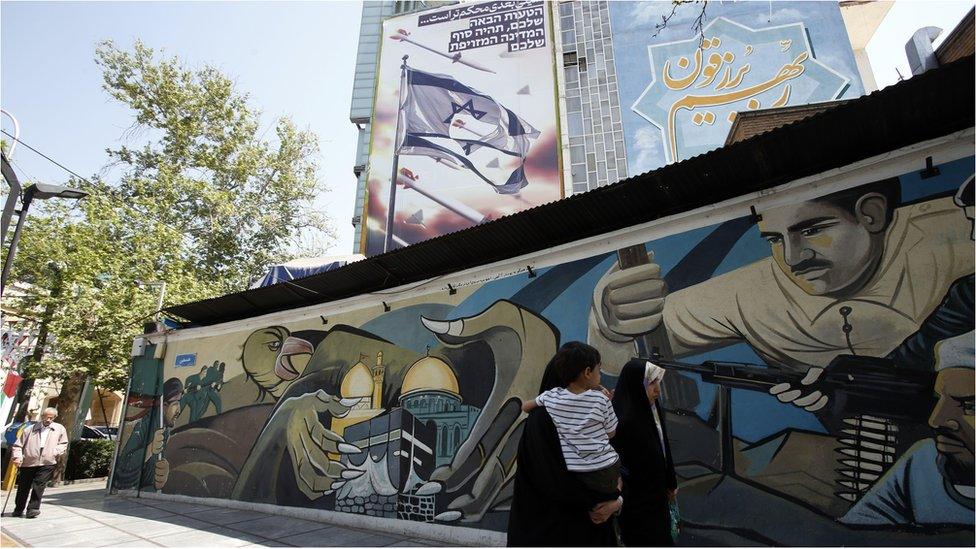US tells Israel it won't join any retaliatory strikes on Iran
- Published

Israeli and US aircraft and air defence systems shot down 99% of the drones launched by Iran.
The White House has warned Israel that the US will not participate in any retaliatory strikes on Iran, senior administration officials have said.
Over 300 drones and missiles were fired at Israel overnight, which Iran said was in response to an 1 April strike on its consulate in Syria.
Almost all weapons were shot down by Israeli, US and allied forces before they reached their targets.
Officials said Joe Biden urged Israel to consider its response "carefully".
Speaking to reporters on Sunday, a senior administration official said that Mr Biden told Israeli Prime Minister Benjamin Netanyahu to "think very carefully and strategically" about how his forces replied to the unprecedented action, the first direct attack by Iran on the country.
The official added that the Biden administration believes Israel "got the best of it" in the exchange, which began when senior Iranian military commanders were killed at an Iranian consular building in Syria.
About 99% of the missiles, drones and cruise missiles launched during Iran's retaliatory operation were shot down or intercepted - which US officials point to as a sign of Israeli military superiority over Iran.
US aircraft and naval vessels shot down dozens of Iranian projectiles as the attack took place. More than 80 drones and at least six ballistic missiles were downed by US aircraft and vessels or by air defence forces over Iraq.
This includes seven drones and a ballistic missile as they prepared to launch from Yemen, US Central Command (Centcom) added in an update on Sunday.
A conversation took place between Mr Biden and Mr Netanyahu at a time "of heightened emotion" just after the attack, which included about 100 ballistic missiles simultaneously flying towards Israel.
During the call, the two leaders had a discussion "about how to slow things down and think through things", with Mr Biden emphasising that Israel has "gotten the best of it".
The official declined to say, however, whether the White House warned against a significant response, saying only that "it is a calculation the Israelis have to make".
In a string of television appearances on US networks earlier in the day, national security spokesman John Kirby repeatedly said that the US had made it clear to Israel that it seeks to avoid a wider conflict.
The senior administration said that the same message has been sent to Iran through diplomatic channels.
Both Mr Kirby and the official said that the US would continue to defend Israel, but has ruled out participating in any Israeli response.
The stance is one that has sparked criticism from some US lawmakers and former officials from both sides of the political spectrum.
Ohio Republican Representative Mike Turner, who serves as chair of the House intelligence committee, said that Mr Kirby's comments about de-escalating the conflict were "wrong".
"It is already escalating, and the administration needs to respond," he said on NBC.
And John Bolton, who served as national security adviser under President Donald Trump, said the US should join Israel if its chose to launch a retaliatory attack on Iran's nuclear programme.
"I think it [Israel] can destroy or disable a very substantial part [of the programme], if not totally," he told NewsNation. "Frankly, if Israel is prepared to go after Iran's nuclear programme, the United States should proudly join them."
In the wake of Iran's attack on Israel, Mike Johnson, the Speaker of the House of Representatives, said that the body would "try again" to pass military aid for Israel.
Previous attempts to send more aid to Israel have stalled amid Democratic calls that the aid package should also include assistance for Taiwan and Ukraine.
Mick Mulroy, a former Deputy Secretary of Defence for the Middle East, told the BBC that aid for Israel should be passed "without delay".
"If it wasn't for US security assistance, we could be facing a major regional war," he said. "That supplement and the ones for Ukraine and Taiwan are in our national security interest. It is not charity. It's part of the US national defence."
Watch: Sirens ring through Jerusalem as projectiles shot down from sky
Related topics
- Published14 April 2024

- Published26 October 2024

- Published14 April 2024
